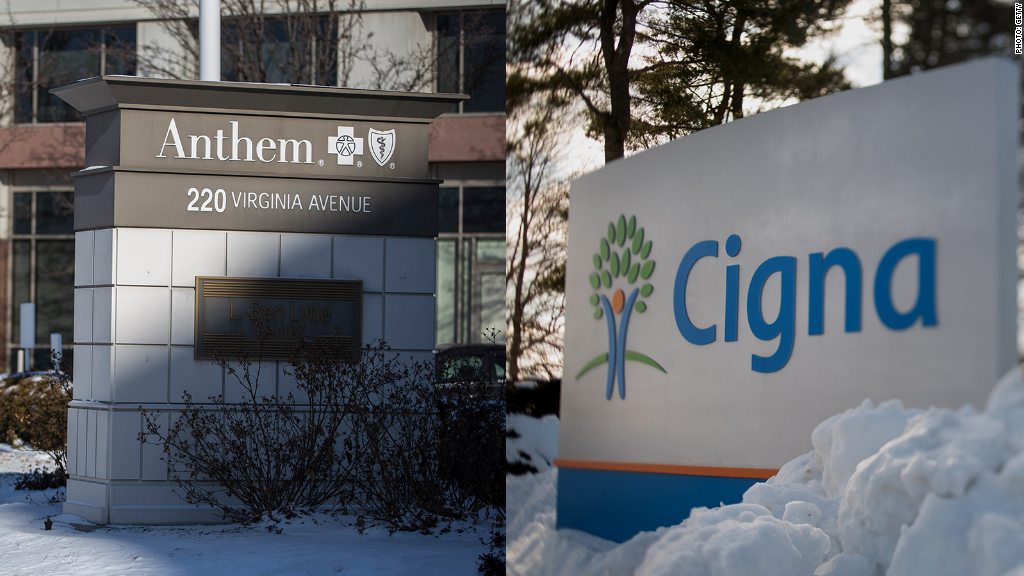
Critics of President Obama think that his Affordable Care Act has the United States on the road to a single-payer health care system.
Eventually, there will be one Lord of the Rings-esque, government-run insurer to rule them all.
Well, guess what? It looks like the forces of the free market are what people really need to be worried about.
The health care industry is going through a massive wave of consolidation.
That is giving fewer (and much bigger) companies control over the drugs we use, the places we buy them, the hospitals we go to, and the insurers that pay for it all.
We could soon be left with a Ma Bell of health care.
Pharmaceutical giants Pfizer (PFE) and Allergan (AGN) confirmed Thursday morning that they have talked about a possible merger.
That would create a company to rival industry leaders Johnson & Johnson (JNJ) and Novartis (NVS) in terms of sales and market value.
It would bring blockbuster drugs like Pfizer's Lyrica, Enbrel and Viagra and Allergan's Botox and Restasis under one corporate roof.
Related: Pfizer-Allergan merger could be biggest deal of 2015
Now I'm not suggesting that this deal, if it were to become official, should be blocked. This is capitalism at work.
But I do think that regulators need to be a little more concerned about how rapidly the health care giants are succumbing to the urge to merge.
In fact, Pfizer and Allergan are talking to each other just months after they both completed other multi-billion dollar deals.
Pfizer bought Hospira, which makes medical devices and injectable drugs, for about $15 billion. The deal closed in September.
Allergan merged with generic drug company Actavis in a $70.5 billion deal this March.
Related: Giant phramacy deal: Walgreens buys Rite Aid
And it's not just Big Pharma that's trying to get even bigger.
Drug store chain Walgreens (WBA) announced plans to buy Rite Aid (RAD) for about $17 billion on Tuesday. If that deal goes through, there will be only two national pharmacy chains: Walgreens and CVS (CVS).
Walgreen's purchase of Rite Aid will allow the company to finally become a bigger player in a business known as pharmacy benefits management.
Pharmacy benefits managers are the middlemen between insurers and drug companies and retailers.
Rite Aid bought a PBM company called EnvisionRx for $2 billion earlier this year.
This could help Walgreens compete more effectively against CVS, which is now also a huge PBM company thanks to its merger with Caremark a few years ago.
CVS bought another PBM company, Omnicare, for about $13 billion earlier this year. Omnicare specializes on pharmacy services for seniors in assisted living centers.
Related: The real deal on Obamacare
Yet another big PBM firm, Catamaran, was bought this summer by health insurer UnitedHealth -- also for about $13 billion. Catamaran has been merged into UnitedHealth's existing PBM, Optum Rx.
So let's sum that all up.
Most of the companies in charge of trying to get consumers good deals on medications may soon be owned by either a giant insurer or the two mega-drug store chains.
The one remaining independent pharmacy benefits manager, Express Scripts (ESRX), has long been considered a desirable takeover target for Walgreens. It wouldn't shock me if it eventually gets scooped up.
But wait. There's more!
If all this wasn't enough to make your head spin, consider that UnitedHealth's four insurance rivals are all in the process of merging.
Aetna (AET) and Humana (HUM) agreed to a $37 billion deal in early July. Cigna (CI) and Anthem (ANTM) agreed to a $54 billion merger just weeks later.
Related: And then there were three? Two big insurer mergers this summer
If regulators give the green light to those two transactions, there will be only three major health insurers left.
The combined Cigna-Anthem would have more members than any other insurer, passing UnitedHealth.
And I haven't even mentioned that the country's biggest nonprofit hospitals -- and publicly traded hospital owners HCA (HCA), Tenet (THC), Universal Health Services (UHS) and Community Health Systems (CYH) -- are also getting bigger through acquisitions.
At some point, antitrust officials, lawmakers and the next president will need to address the fact that consumers have far fewer choices about their health care options than they did a few years ago.
Small biotechs and hedge funds that have aggressively raised prices for orphan drugs (i.e. medications for rare illnesses) are getting all the headlines right now.
While it's definitely unfair for the Turings of the world to gouge consumers, they are easy political targets.
But health care oligopolies are a far more dangerous risk. They have the potential to make the nation's entire health care system a lot less friendly for all Americans.


